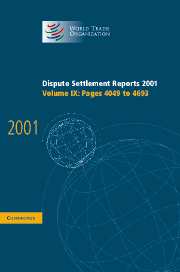Report of the Panel
from United States - Safeguard Measures on Imports of Fresh, Chilled or Frozen Lamb Meat from New Zealand and Australia (WT/DS177, WT/DS178)
Published online by Cambridge University Press: 13 December 2017
Summary
INTRODUCTION
Complaint of New Zealand
On 16 July 1999, New Zealand requested consultations with the United States pursuant to Article 4 of the Dispute Settlement Understanding (“the DSU”), Article XXII:1 of GATT 1994 and Article 14 of the Agreement on Safeguards (“the Safeguards Agreement”, “SG”) with regard to a definitive safeguard measure imposed by the United States on imports of lamb meat.
On 26 August 1999, New Zealand and the United States held the requested consultations, but failed to resolve the dispute.
On 14 October 1999, New Zealand requested the establishment of a panel to examine the matter.
Complaint of Australia
On 23 July 1999, Australia requested consultations with the United States pursuant to DSU Article 4, GATT Article XXII:1 and SG Article 14 with regard to the definitive safeguard measure imposed by the United States on imports of lamb meat.
On 26 August 1999, Australia and the United States held the requested consultations, but failed to resolve the dispute.
On 14 October 1999, Australia requested the establishment of a panel to examine the matter.
Establishment and Composition of the Panel
At its meeting of 19 November 1999, in accordance with DSU Article 9 the Dispute Settlement Body (“the DSB”) established a single Panel, pursuant to the requests made by New Zealand and Australia.
At that meeting, the parties to the dispute also agreed that the Panel should have standard terms of reference, as follows:
“To examine, in the light of the relevant provisions of the covered agreements cited by New Zealand in document WT/DS177/4 and by Australia in document WT/DS178/5 and Corr. 1, the matter referred to the DSB by New Zealand and Australia in those documents, and to make such findings as will assist the DSB in making the recommendations or in giving the rulings provided for in those agreements”.
On 21 March 2000, the parties agreed to the following composition of the Panel:
Chairman: Professor Tommy Koh
Members: Professor Meinhard Hilf
Mr. Shishir Priyadarshi
Australia (in respect of New Zealand's complaint), Canada, the European Communities, Iceland, Japan and New Zealand (in respect of Australia's complaint), reserved their rights to participate in the panel proceedings as third parties.
- Type
- Chapter
- Information
- Dispute Settlement Reports 2001 , pp. 4107 - 4693Publisher: Cambridge University PressPrint publication year: 2004



